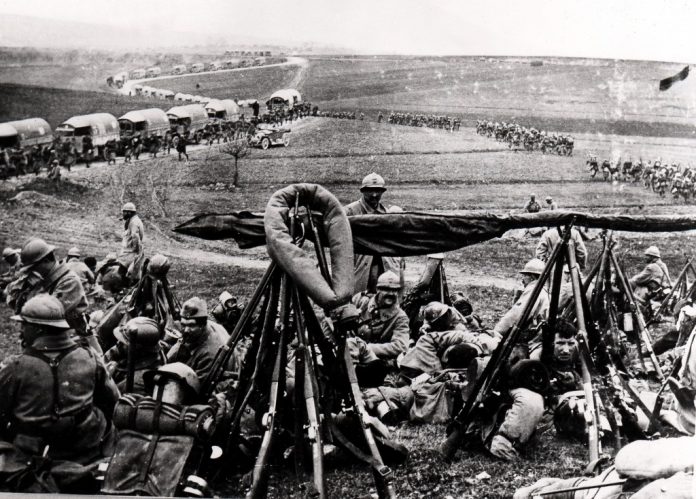The booming of artillery shells making impact with the unstable, viscous mud, the discordant shrill of trench whistles, and the insufferable gloom encompassed Northern France 100 years ago. Soldiers faced brutal conditions, surrounded by disease and a sense of hopelessness. In this age of modern war, a new advent of military innovation met with outdated, 19th century tactics, which led to the static entrenchment of fighting on the Western Front. While most lines of fighting were often misleadingly dubbed ‘quiet’, the Battle at Verdun seemed to never cease.
On December 18th, marks the resolution of the Battle of Verdun in the First World War.
The battle began as an Imperial German assault on the Meuse Heights, a series of defensible hills from which they planned to rain fire, dealing devastating casualties on a pressing French counteroffensive attempting to retake the valuable position. This strategy proposed by Erich von Falkenhayn, German Imperial Defense Minister, saw initial success. According to him, the whole purpose of initiating the engagement was to “bleed France white,” which suggests that the Germans intended to force a French surrender by way of attrition.
The German army managed to capture the hills, but when encountering the French, their plans did not pan out as initially expected. Despite the German tactical advantage, they suffered roughly as many casualties as the French. Referred to as the ‘meatgrinder’ of the Western Front, Verdun claimed the lives of over 250,000 soldiers.
Upon achieving victory, the advancing French captured some 11,000 prisoners of war, and the Germans were forced to retreat further back, away from the hills. When captured German officers complained to Charles Mangin, French infantry general, about the poor conditions they experienced, he replied “Mais, messieurs, je ne vous attendais pas sitôt, en si grand nombre.” (But, gentlemen, I did not expect you so soon, in so great number.) Mangin paraphrased a victorious Frederick the Great after the Battle of Rossbach, a victory over the French Empire 150 years prior to Verdun in the Seven Years’ War, as a slight against the defeated, captured German forces. However, this sarcastic quip holds truth to the situation of trench conditions.
Mr. Wester, Jesuit College Prep history teacher and director of the information commons, shared insight about the horrendous state of the average foot soldier.
Confronted with adversity at every turn, a soldier on the Western Front deals with “living in trenches, especially ones that aren’t properly irrigated or drained,” and the unsanitary, morbid conditions that Mr. Wester described. “All these kinds of things in an environment where you’re exposed to [the elements] 24 hours a day, and your feet are wet 24 hours a day,” leads to an experience plagued by “trench foot, or immersion syndrome [that] leads to other things. Any minor wound or injury you might have from something as simple as a scratch, in those conditions, can escalate into something greater. Hygiene and health certainly have a huge play in the number of deaths there.” During artillery bombardments, soldiers found shelter in makeshift foxholes, playing cards and telling stories just to stay sane through the cannonade.
Most likely due to the atrocious conditions, filmmakers and video game developers alike have refrained from creating content about this dark period of human history. The horrid, static conditions hardly make for an exciting story. The Second World War, however, has seen a surplus in screen time, even though it hosted the bloodiest battles in history, as well as tragic atrocities never performed on such a grand scale.
Mr. Wester offers a reason why the Second World War receives more time in the limelight than its predecessor, saying that looking back “in hindsight, it’s really easy, because when fighting Nazis, they’re universally the bad guys, so we have a built-in bad guy.” In the First World War, the conflict is not as black and white. Mr. Wester described that “it’s complex, it’s geopolitical, it’s regional, and it has a lot to do with weird alliances and treaties that I don’t think the majority of people who read about it understand. It makes it difficult to cover the context and ‘action’ from a conflict like that.”
This war engulfed the entire European subcontinent in a whirlwind of political incompetence and gloom. To this day, the true agitator of the war, even after Versailles, is still historically debatable. Student Drew Abbott ’18 reflects upon the ethics of war, commenting that “in war, there aren’t really bad guys or good guys. Each side thinks they’re right, and fights for what they believed in.” From Drew’s remark, we can find solace and empathy for both sides. A French conscript, at his spiritual core, was no different than a German conscript, and the men lost at Verdun, on both sides, have earned the solidarity and respect their honoring countries give them. A filmmaker, therefore, would struggle to find a villain as both sides endured so much, and both sides faced tragedy and destruction. The First World War encompasses the human condition at its worst, a war torn world in a conflict void of a concrete, valid justification. The concept of dishonorable, total war dominated the world.






